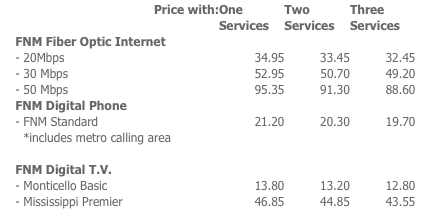
Fast, affordable Internet access for all.

But the entire congratulatory press release glosses over a key fact: the reason that Monticello received a fiber network was the town's decision to install a municipal-owned fiber network to every home in town… spawning a set of TDS lawsuits that went all the way to the Minnesota Supreme Court, which ruled in favor of the town.I might also note that the press release and much of the coverage also glosses over a one-year contract and early termination fee (though it isn't clear if this is applied in all circumstances). However, Nate nails the story by framing it with the title "Want 50Mbps Internet in your town? Threaten to roll out your own."
We spoke to TDS about the situation last year, and its director of legislative and public relations told us that TDS didn't act earlier because it didn't actually know that people really, really wanted fiber; once the referendum was a success, the company moved quickly to give people what it now knew they wanted.Of course, TDS did not start rolling fiber after the referendum. They waited. It was only after the City successfully bonded for the project that TDS acted (first by filing a lawsuit to block competition and second by investing in their network to be competitive when the doomed lawsuit would inevitably be dismissed). TDS did not change course because they suddenly realized that people wanted better broadband, they did it because they knew that they would have to invest or perish when confronted with actual competition. Nate's article looks at other communities that have followed a similar trajectory. This story seems to have inspired another excellent post by Phillip Dampier at Stop the Cap: Municipalities: If You Threaten to Build It Yourself, Your Faster Speeds Will Come. I take some issue with the title - hollow threats are rarely enough. While the threat of competition may be enough, in some circumstances, to temporarily boost investment from incumbents, only actual competition will ensure that investment continues and rates remain affordable. Karl Bode picked up on the story which led to some interesting posts in the comment section ... especially toward the bottom when other TDS customers weigh in on their inability to get broadband at any speed. I have to fully agree with this commenter:
This might be one of the few instances when I feel a telecom did the wrong thing by offering FTTH. If TDS actually cared about being providing faster and better service to their customers they would be wiring cities that don't have a FTTH alternative. After fighting, delaying and losing FTTH all in an attempt to maintain their monopoly, TDS has developed a new strategy. Undercut muni FTTH till it fails. They can subsidize FTTH in monticello with money from the rest of their network. As soon as muni fiber fails they can shut down or raise price of their own fiber network. Maybe I'm wrong. Maybe Monticello MN population 10,000 (very rural) is such as lucrative market that TDS is a visionary by offering FTTH. That must be why verizon wires only rural cities and sells off urban and suburban ones. [sarcasm noted]The commenter goes on to note that if people continue signing up with TDS (after overwhelmingly supporting the referendum to build the network), they will suffer from the fallout of not being able to pay off the revenue bonds and TDS will resume its poor practices if competition ceases.
 Though TDS grabbed headlines with its bold (read: predatory) 50/20 offering, Monticello Fibernet is no slouch. See prices on right - no contracts, no "introductory" prices, and all connections are symmetrical. Some have asked me how Monticello will respond to the new pricing and speeds from TDS and I do not know the answer.
I think it important to note that Monticello owns the network, but the network is operated by, and services offered by Hiawatha Broadband Communications, not the municipal government. Though HBC (a company out of SE MN with a great reputation for customer support and meeting community needs) is far more responsive that the incumbents, Monticello has different constraints upon it than most community fiber networks where the services are offered by the network owner.
Though TDS grabbed headlines with its bold (read: predatory) 50/20 offering, Monticello Fibernet is no slouch. See prices on right - no contracts, no "introductory" prices, and all connections are symmetrical. Some have asked me how Monticello will respond to the new pricing and speeds from TDS and I do not know the answer.
I think it important to note that Monticello owns the network, but the network is operated by, and services offered by Hiawatha Broadband Communications, not the municipal government. Though HBC (a company out of SE MN with a great reputation for customer support and meeting community needs) is far more responsive that the incumbents, Monticello has different constraints upon it than most community fiber networks where the services are offered by the network owner.
 Meanwhile, this graphic from the comments of Karl Bode's DSL reports story reveals a fundamental truth: Monticello citizens have a unique opportunity. No one outside the community has access to faster speeds or lower prices. They have the deal with same annoying practices where the user very rarely achieves the advertised speeds and price spikes following the "introductory" period. Further, many of the DSL packages require a phone package as well, making prices higher than advertised.
Meanwhile, this graphic from the comments of Karl Bode's DSL reports story reveals a fundamental truth: Monticello citizens have a unique opportunity. No one outside the community has access to faster speeds or lower prices. They have the deal with same annoying practices where the user very rarely achieves the advertised speeds and price spikes following the "introductory" period. Further, many of the DSL packages require a phone package as well, making prices higher than advertised. In an announcement last week, Alexandria, Minnesota's (pop. 15,000) electric and water utility (ALP Utilities) announced it would be selling its business-facing fiber network to Arvig, a 40-percent employee-owned Internet Service Provider (ISP) that has 54,000 subscribers across urban and rural Minnesota.
The U.S. Treasury Department announced another six states have been approved to receive nearly $1 billion in Capital Projects Funds from the American Rescue Plan to bring new broadband infrastructure to more than 180,000 homes and businesses.
In 2020, New York City officials unveiled a massive new broadband proposal they promised would dramatically reshape affordable broadband access in the city.
Instead, the program has been steadily and quietly dismantled, replaced by a variety of costly half-measures that critics say don’t solve the actual, underlying cause of expensive, substandard broadband.
AARP Minnesota has taken notice: “broadband infrastructure has not been deployed evenly to communities across the state.”
Like countless U.S. communities, Duluth, Minnesota (pop. 86,000) got a crash course on the importance of affordable broadband during the Covid-19 crisis. Those struggles in telecommuting and home education helped fuel a dramatic new broadband expansion plan that, if approved by the city council, could revolutionize affordable access citywide.
